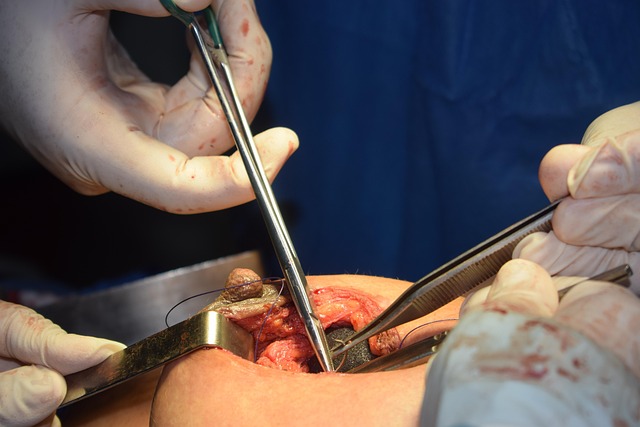Ovarian surgery impacts fertility due to hormonal changes and altered structures. Consulting reproductive endocrinology specialists is vital for understanding outcomes and creating personalized strategies post-surgery. After recovery, exploring fertility treatment alternatives like IVF and ICSI is crucial for conceiving. Healthcare professionals guide patients through options tailored to unique circumstances, ensuring informed decisions and confidence in building a family. Long-term fertility requires open communication with providers about treatment needs influenced by surgery extent, health, and age, along with regular gynecological check-ups.
“Discovering the path forward: Navigating Fertility After Ovarian Surgery. This comprehensive guide explores the multifaceted impact of ovarian surgery on fertility, delving into the potential effects on reproductive capabilities. We dissect recovery processes and present a range of reproductive options post-surgery. Furthermore, we uncover alternative fertility treatments and long-term considerations for those seeking conception in the aftermath of ovarian surgery. Understanding these aspects is crucial for informed decision-making regarding future fertility journeys.”
Ovarian Surgery: Potential Impact on Fertility
Ovarian surgery, whether for the removal of cysts, fibroids, or more complex conditions like endometriosis, can significantly impact a woman’s fertility. While it may be life-saving or necessary for health reasons, the procedures can lead to changes in hormonal balance and reproductive structures that affect fertility. The extent of the impact varies depending on the type and extent of surgery, as well as individual factors like age and overall health.
For many women, fertility treatment after ovarian surgery becomes a crucial consideration. Depending on their specific situation, options may include assisted reproductive technologies (ART) such as in vitro fertilization (IVF). Consulting with healthcare professionals specializing in reproductive endocrinology is essential to understanding the potential outcomes and developing tailored strategies for preserving or enhancing fertility following ovarian surgery.
Understanding Recovery and Reproductive Options
After ovarian surgery, understanding the recovery process and exploring reproductive options is essential for individuals navigating their fertility journey. The road to recovery varies depending on the extent of the surgery and each patient’s unique circumstances. Typically, patients experience a period of rest and healing, often requiring a few weeks to fully recover. During this time, it’s crucial to follow medical advice regarding pain management, wound care, and any prescribed medications.
One aspect that deserves attention is the potential impact on fertility. Some ovarian surgeries, like cyst removal or sterilization procedures, may affect egg reserves and reproductive capabilities. However, advanced fertility treatments after ovarian surgery offer hope for those seeking to conceive. These include in-vitro fertilization (IVF), where eggs are extracted, fertilized in a lab, and then transferred to the uterus, enhancing the chances of successful pregnancy. Consulting with healthcare professionals specializing in both ovarian surgery and fertility treatment is vital to determine the best course of action tailored to individual needs.
Exploring Fertility Treatment Alternatives Post-Surgery
After ovarian surgery, exploring fertility treatment alternatives is a crucial step for individuals aiming to conceive. While surgery can be effective in addressing underlying issues, it’s essential to remember that every patient’s journey is unique. Fertility specialists often work closely with patients to determine the best course of action, which may include assisted reproductive technologies (ART) like in vitro fertilization (IVF). These advanced treatments offer hope for those who might face challenges in achieving pregnancy naturally post-surgery.
Available options cater to various needs, from egg freezing and fertility preservation to IVF with intracytoplasmic sperm injection (ICSI). Each approach has its merits and considerations, allowing individuals to make informed decisions tailored to their specific circumstances. By discussing these alternatives with healthcare professionals, patients can navigate the post-surgery phase with confidence, knowing there are avenues to explore for building a family.
Long-Term Considerations for Future Conception
After ovarian surgery, it’s crucial to consider the long-term implications for future conception. While many women successfully conceive naturally post-surgery, others may require fertility treatments like in vitro fertilization (IVF) or intrauterine insemination (IUI). The decision to pursue these treatments depends on several factors, including the extent of the surgery, individual health status, and age. It’s essential for patients to have open discussions with their healthcare providers about their options and potential outcomes.
Looking ahead, women should be aware that certain types of ovarian surgery can affect hormone levels and egg reserves. These changes might impact future fertility, necessitating proactive planning if pregnancy is desired in the long term. Regular check-ups with gynecologists are vital to monitor any potential complications and assess reproductive health over time, especially when considering fertility treatment after ovarian surgery.
Ovarian surgery can significantly impact fertility, but understanding the potential outcomes and exploring tailored reproductive options post-surgery offers hope for those seeking future conception. By delving into fertility treatment alternatives, individuals can make informed decisions and navigate the challenges of ovarian surgery with a supportive mindset. Remember that each person’s journey is unique, and with the right knowledge and resources, it’s possible to discover sustainable solutions for fertility treatment after ovarian surgery.
